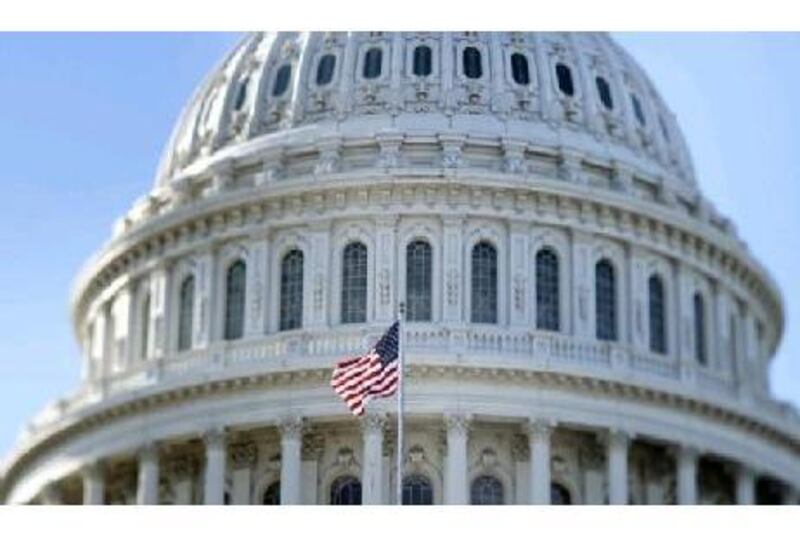It's an eye-watering sum, US$1 trillion - a thousand billion, or one followed by 12 zeros. It's about the annual GDP of Turkey, or Indonesia. But in the world of foreign exchange trading it's not such a big thing. The Bank for International Settlements estimated recently that the average daily turnover of the global foreign exchange market was US$3.95 trillion (Dh14.5tn) a day. That's the value of all the currency transactions that whizz round the world as part of the normal pattern of trade, commerce and financial engineering conducted by individuals, corporations and governments.
A hearing by US congressional officials, which began on Monday in Washington, on alleged money laundering in transactions totalling $1tn and involving Middle East institutions should be seen in this context. The allegation is not that the $1tn, which passed between the Middle East and the US over a six-year period, was "dirty" money. It is that within the aggregate sum there were transactions worthy of the attention of US regulators and the US counter-parties to the Middle East institutions involved in the trades.
Allegedly included on the Middle East side were transactions associated with either the al Gosaibi business family of Saudi Arabia, or their former associate, Maan al Sanea. On the US side, many of the deals went through Bank of America. Congress will reach its own verdict on whether or not any of the transactions warrant further attention. The House committee can call more witnesses or instruct the department of justice to begin a formal investigation.
But the fact that the hearings are taking place at all is evidence of a hardening of US attitudes towards the movement of money around the world. A US lawyer said: "There is a feeling regulators, prosecutors and Congress took their eyes off the ball in the financial crisis. Now it's time to ask: what about the huge volumes of money washing round the world and through the US banking system?" In the US, money laundering is defined as the practice of engaging in financial transactions to conceal the identity, source or destination of illegally obtained money or other assets.
Under federal law, it is a crime according to the Money Laundering Control Act of 1986, which placed the principle of "know your customer" into the US financial system. This was further strengthened by the US Patriot Act of 2001, after the attacks of September 11 that year, which focused more closely on financing for terrorist organisations. Banks, law firms and other financial institutions are required to vet potential customers and depositors before doing business with them and to file "suspicious activity reports" with the authorities if they are not satisfied with the bona fides of a customer.
Those requirements have not always been satisfied. In 2006, Bank of America acknowledged that lack of controls allowed South American money launderers to move $3bn through a Manhattan account. The bank said then that it "took seriously its anti-money laundering obligations … and never knowingly does business with persons, organisations or businesses engaged in illegal activity". Evidence of a tougher approach to money laundering by US politicians has been coming for some time. Carl Levin, the Democrats senator for Michigan and the chairman of the permanent Senate subcommittee on investigations, has for years been one of the staunchest advocates of a harder line.
This year Mr Levin identified four cases of money laundering by African politicians and their families, which he said depended on the complicity of US "lawyers, realtors and banks". He recommended new legislation to "curb the use of American institutions by corrupt foreign officials who have stolen their countries' wealth and denied their citizens of vital resources for health, education, and the alleviation of poverty".
Another significant step in the war against criminal money was the uncovering this year of the role played by US financial institutions in the laundering of almost $400 million of cash associated with Mexican drug cartels. In what was then described as the "largest violation of US money-laundering laws in history", Wachovia, a bank owned by Wells Fargo, agreed to pay $160m in settlement of allegations brought by US prosecutors that the bank had failed to monitor Mexican accounts properly over a three-year period.
This was seized on by Peter King, the senior Republican member of the House of Representatives committee on homeland security, the powerful body set up in response to the 2001 terrorist attacks, as evidence that some American banks were not applying anti-money laundering rules strictly enough. "Unfortunately, too often banks turn a blind eye to potential money laundering activity, believing that fees generated from illegal transactions far outweigh the cost of any possible government fine," Mr King said in a letter to the US attorney general. "While this may add to a bank's profit margin, it does so at grave risk to US national security."
Mr King has also been instrumental in the campaign to have some Middle East institutions investigated by the US authorities over possible money laundering. "I am puzzled by the lack of red flags raised when enormous volumes of money move through the US banking system from high-risk currency exchanges," he wrote in the same letter, referring to the dispute between the al Gosaibis and Mr al Sanea and calling for an investigation by the department of justice.
Mr King's influence in such matters is growing. If, as many predict, the Republicans take large gains from the Democrats at this November's congressional elections, he could become the chairman of the committee on homeland security. fkane@thenational.ae





